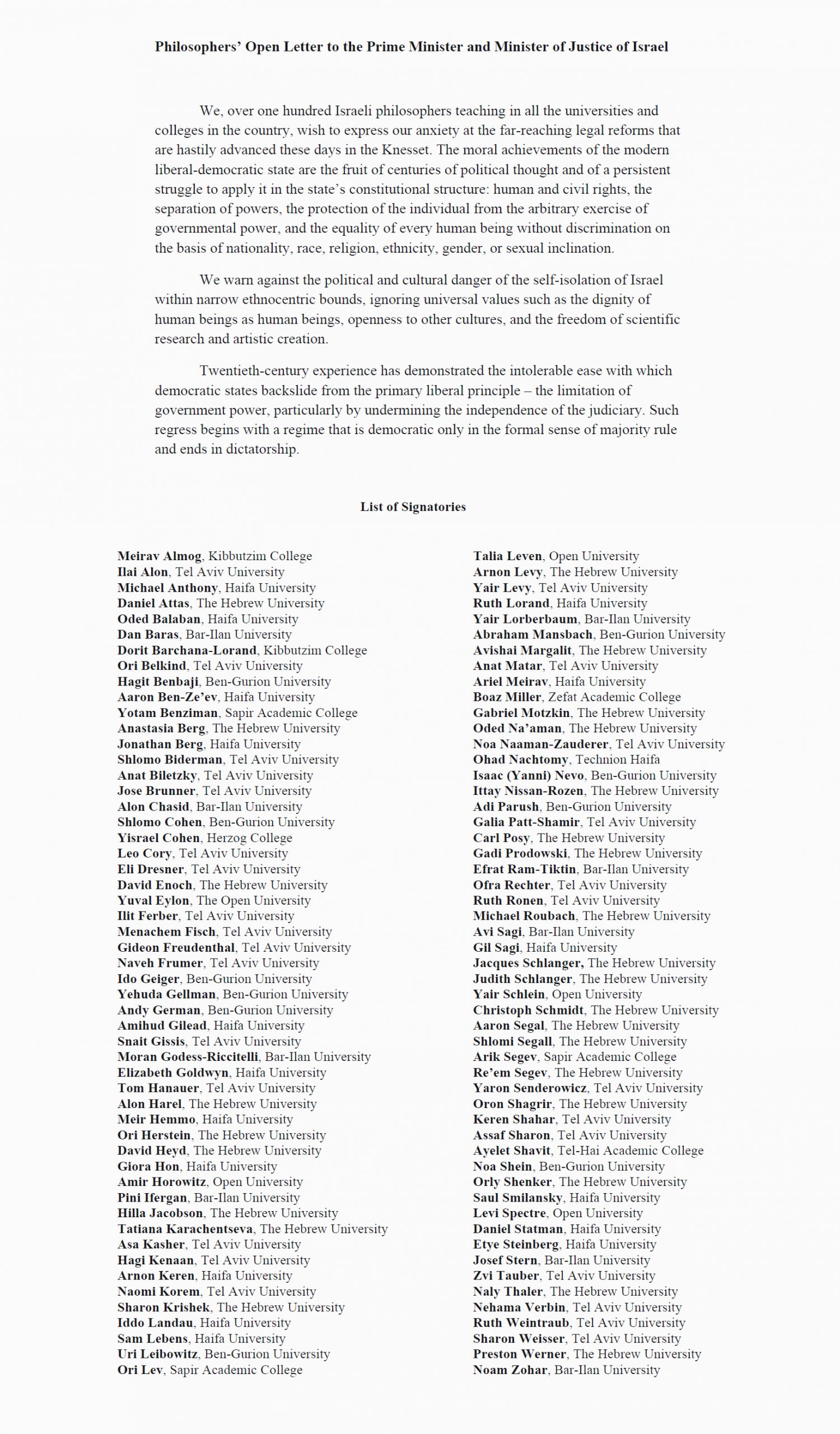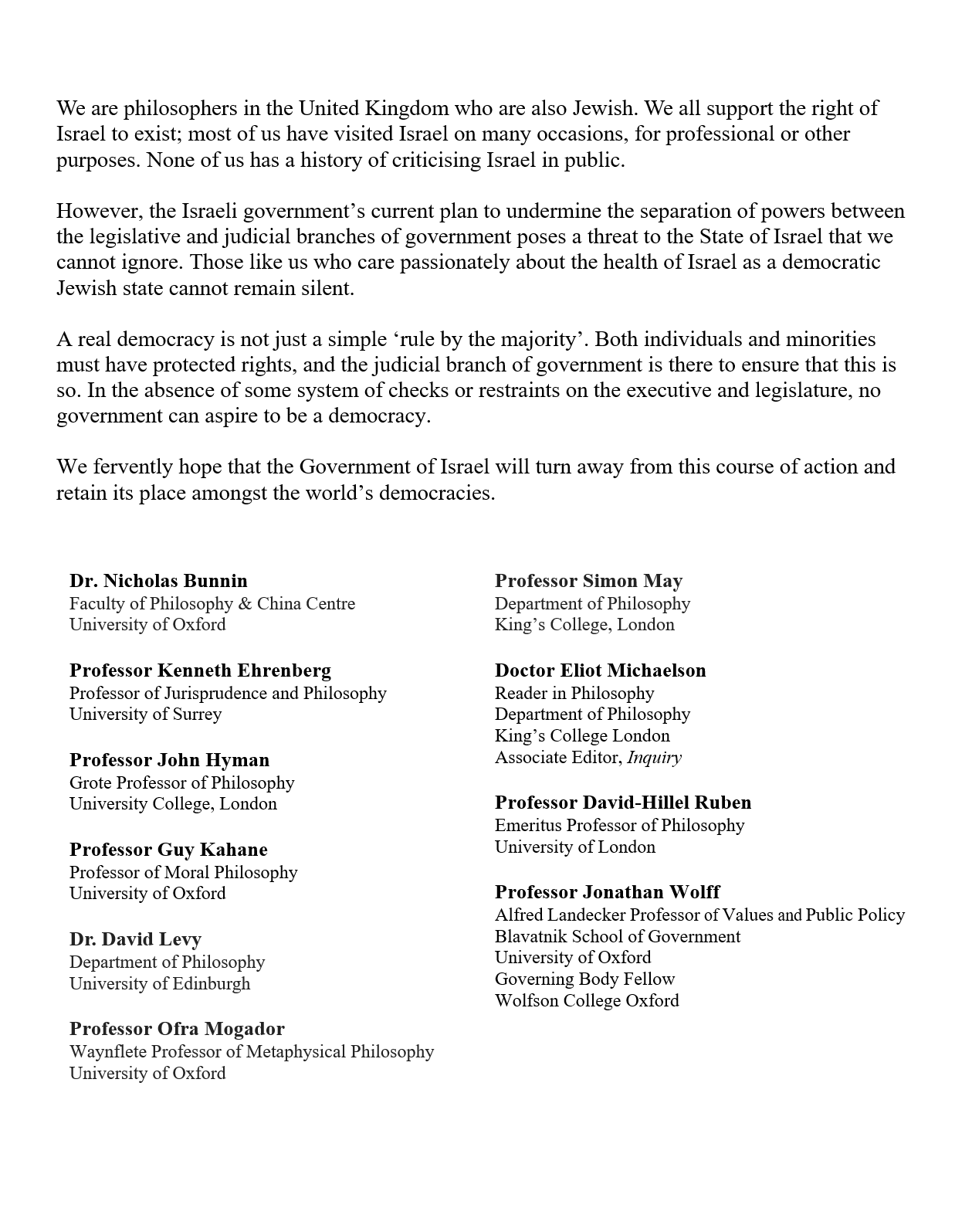Israeli Philosophers Oppose Government’s Anti-Democratic “Reforms” (updated)
Over 100 Israeli philosophers have signed an open letter to the Prime Minister of Israel, Benjamin Netanyahu, and the nation’s Minister of Justice, Yariv Levin, expressing concern about recently advanced legal changes.

[photo by Ohad Zwigenberg]
The new government in Israel has launched—with unbelievable speed—a campaign for massive, deeply anti-democratic constitutional “reform”. The main people behind this reform take their cues from similar “reforms” in such places as Poland and Hungary (initially only implicitly, recently they are entirely open and loud about looking up to these places). These measures include a change in the appointment and promotion procedures for judges that will make it entirely politicized and up to the current coalition’s whims; putting in place an override clause that will allow the current coalition to set aside court’s decisions that declare pieces of legislation unconstitutional; severely weakening the status and authority of the government’s legal advisors; and more.
The aim—and likely consequence—of these measures is making our independent judiciary a thing of the past, and giving the current (extreme right-wing) coalition unencumbered force, with nothing even remotely resembling checks and balances. It’s easy to guess who will be the first to suffer. (For one example—of the expected consequences for women—see here.)
These measures are opposed by a huge majority of law professors (see, for instance, the various pieces here and here).
The open letter states:
We, over one hundred Israeli philosophers teaching in all the universities and colleges in the country, wish to express our anxiety at the far-reaching legal reforms that are hastily advanced these days in the Knesset. The moral achievements of the modern liberal-democratic state are the fruit of centuries of political thought and of a persistent struggle to apply it in the state’s constitutional structure: human and civil rights, the separation of powers, the protection of the individual from the arbitrary exercise of governmental power, and the equality of every human being without discrimination on the basis of nationality, race, religion, ethnicity, gender, or sexual inclination.
We warn against the political and cultural danger of the self-isolation of Israel within narrow ethnocentric bounds, ignoring universal values such as the dignity of human beings as human beings, openness to other cultures, and the freedom of scientific research and artistic creation.
Twentieth-century experience has demonstrated the intolerable ease with which democratic states backslide from the primary liberal principle—the limitation of government power, particularly by undermining the independence of the judiciary. Such regress begins with a regime that is democratic only in the formal sense of majority rule and ends in dictatorship.
Professor Enoch adds, “Many outside of Israel have also spoken clearly against these ‘reforms’. It would be great if philosophers elsewhere are also heard on this.”
The letter and the list of its signatories is below.

UPDATE (2/28/23): A group of British Jewish philosophers have written a letter in support of their Israeli colleagues:




Signing a letter such as this requires personal courage. I can only express my admiration for all the signatories.
Meh. The traditional liberal democratic view, outside the USA, and particularly in the rest of the common law world, was that courts ought not to be doing the sorts of things the Israeli court regularly does (or the American SCOTUS does, either); this, precisely based on rule of law and democratic accountability issues. The history of the Israeli court, from the 1980s onward, is that of a power grab in order to advance partisan politics.
Courts can defend basic rights, the separation of powers, equality, etc, without engaging in the sort of chicanery and shenanigans one finds in the Israeli court. Curtailing its specific powers to do so is no threat to liberal democracy as such. (Though it’s kind of ridiculous for the Israelis to insist that theirs is a LIBERAL democracy anyway…; still, it wouldn’t undermine the rule of law or democracy in Blighty, in NZ, etc.)
Now that the balance of power has shifted in the American SCOTUS from the blue to the red team, and with cases like Dobbs, Americans are for the first time in a long time rightfully questioning the legitimacy and democratic quality of its federal courts’ actions. Would that they dig deeper into the causes (and not just to defend their pet partisan rights), such as the judicial review power to “overturn” legislation (rather than, say, make mere declarations of incompatibility), the power to concoct constitutional rights ex nihilo, etc.
Where to start? Well, Marburv v Madison was obviously a mistake and so it ought to be overturned.
As American power seems to have zenithed, perhaps we shall see such judicial review functions scaled back in Western democracies. Doing so would provide a better “checks and balances” system and create the possibility of actual “dialogue” between the various branches of government (rather than just have the legislature accommodate the highest court’s dictates).
Wow, this is a really bad take. I’m not even sure you are arguing in good faith here, but I’ll respond for the sake of any readers for whom this comment may have obfuscated how bad these proposed reforms are.
As you say,
“Courts can defend basic rights, the separation of powers, equality, etc, without engaging in the sort of chicanery and shenanigans one finds in the Israeli court. Curtailing its specific powers to do so is no threat to liberal democracy as such.”
Let’s grant that claim for the sake of argument. You should still be against these reforms since this isn’t what they are doing. Many center-right Israelis who are in favor of judicial reform are against these reforms precisely because this is not what they are doing.
If your concern is for checks and balances in a democracy (or ethnocracy with a democratic face, as the case may be), these reforms are probably the worst possible thing, given that the proposed Override clause would allow the parliament to overrule any Judicial decision by a simple majority, including those which violate Israel’s Basic Laws (not a constitution, but the closest thing Israel has to one). It would also allow, in its current form, allow the parliament to pre-emptively laws from judicial review.
Given that, in a parliamentary system like Israel, the Legislative and Executive branches are de facto the same, these reforms would provide virtually unlimited power to the 61 or so members of parliament who happen to be members of the coalition at any given time. There are no checks, there are no balances (remember no constitution in Israel either).
It gets far worse, but I’ll stop myself because there are many other signatories and legal experts who can go into this in much more detail.
Thanks Preston,
It’s actually your comment that one could take to be in bad faith, especially given your take on the Override Clause and nonsense claim that “[y]ou should still be against these reforms since this isn’t what they are doing”, when that’s exactly what they’re doing. However, to invoke the principle of charity, given that you’re just some moral-pol philosopher, it’s far more likely that you just have no idea what you’re actually talking about.
For the Override Clause tracks, and you’ve said nothing more than what I said above about, the ideas of overcoming judicial supremacy, preventing judges from making crap up out of cloth to fit their partisan politics of the moment, and furthering a dialogical approach to governance (per “dialogue” constitutional theories that have some prominence in Commonwealth countries). Checks and balances, moreover, could come in the form of things like a court’s more traditional, limited “judicial review” to just be able declare incompatibilities. (Suffice it to say that I might know something about how Parliamentary systems work, both historically and today…). Again, the idea is to eliminate judicial review — in the American-based Marbury sense — and certain other judicial powers as they are violative of both the rule of law and democratic accountability.
You would not be defending the Israeli court, and neither would the signatories of the letter, if that court regularly used (abused) those powers to achieve political results you disliked. The problem, again, rests in the powers themselves and their penchant for (regular/systematic) abuse, and not (just) the particular results they can effectuate.
Prior to its gaining American-style judicial review power, the House of Lords in England had the mere power to note declarations of incompatibility; it could not override Parliamentary supremacy as such. That changed when England gained both a supreme court and the power of judicial review to “override” legislation. No seriously believes that opponents to that change were seeking to curtail the rule of law or democracy when claiming that it was a bad thing for the new English court to gain such power. It’s unquestionable that, instead, opponents were worried about oligarchical overreach.
The same is true of early 20th century American critics of SCOTUS, especially during that court’s pushback against the New Deal, e.g., in both academic and populist works such as Roe’s Our Judicial Oligarchy.
What’s amazing today — where critical legal theory, critical race theory, and legal realism have gained such prominence — and given abundant empirical evidence about politics really driving so much of the highest courts in our legal systems, that anyone could with a straight face claim that these courts are a democratic, (fundamental) rule-bound “check and balance” upon the system of government, one that perforce defends the basic laws, the constitution, the law of the land, the fundamental rights, etc. Further, supreme court members’ complete lack of democratic accountability is precisely why certain legislative bodies regularly pass the buck on key political issues to let the highest court provide — partisan — answers instead.
You also weirdly seem to assume that an ethnocracy cannot be a democracy.
*Prior to England’s gaining
“Prior to its gaining American-style judicial review power, the House of Lords in England had the mere power to note declarations of incompatibility; it could not override Parliamentary supremacy as such. That changed when England gained both a supreme court and the power of judicial review to “override” legislation. No seriously believes that opponents to that change were seeking to curtail the rule of law or democracy when claiming that it was a bad thing for the new English court to gain such power. It’s unquestionable that, instead, opponents were worried about oligarchical overreach”
I’ll defer to others on Israeli law and politics, but this is completely wrong on UK law and politics.
(1) The Supreme Court has nothing to do with the House of Lords (although it replaced a former committee of the House of Lords), is a UK body and not a specifically English one, and was not granted any powers that were not already available to its predecessors.
(2) Judicial review is a longstanding feature of the UK constitution and was not recently changed. It is probably being used more now than formerly but it is politically disputed whether that is because the courts are getting more activist or because the current government is acting more often in ways that push the boundaries of legality.
(3) Judicial review in the UK is review of whether the Government was following the law; it is not review of the law itself. If the Government is found to be acting illegally it remains within its power to amend the law to change that.
(4) The Supreme Court cannot override Parliamentary sovereignty. It is sovereign on the interpretation of the law but it always remains possible for Parliament to pass new legislation enforcing the Goverment’s own interpretation of the law.
The nearest one gets is that the Human Rights Act requires the courts to resolve ambiguity so far as possible in conformity with that Act. But if Parliament passes a law unambiguously in conflict with the Act, the most the courts can do is note it.
(The process basically goes like this:
Government: we want the police to crack down on dissent. Parliament, pass a law letting them.
Parliament: new law! The police can shoot protestors where necessary to preserve order.
Supreme Court: we will interpret ‘where necessarily’ *extremely* narrowly, given otherwise there would be a clash with the Human Rights Act.
Government: Not what we meant. Parliament?
Parliament: new law! Notwithstanding the Human Rights Act, police officers shall have full discretion to shoot protesters whenever in their sole judgement it would increase the likelihood of order by any amount, however small.
Supreme Court: we note that the new law conflicts with the HRA. (But it’s still the law.)
(5) It is absolutely untrue as a description of UK politics over the last few years that everyone accepts that opponents of judicial review are motivated by worries about oligarchical overreach. To the contrary, it is quite widely (and in my view correctly) felt that the Government, especially under Boris Johnson, resented the constraints placed on the Government’s actions by the courts’ requirement that the Government follow the courts’ interpretation of the law, and wanted to undermine the courts’ constitutional right to decide on that interpretation. It is not conventional wisdom in the UK (to put it mildly) that when Johnson moved against the courts in 2020 and 2021 he was motivated by disinterested concerns about the constitution rather than by revenge for his humiliation by the supreme court when they annulled his prorogation of Parliament in 2019 on the grounds of protecting Parliamentary sovereignty. To my eye the resemblance to current Israeli issues is pretty close, albeit the current UK government has gone nowhere near as far as Netanyahu intends to.
I’ll also add (since it comes up elsewhere in your post):
(6) Criticisms of the UK (or, as I understand it, Israeli) system by comparison to the US miss the mark. What creates constitutional deadlock and arguable over-empowerment of the courts in the US is the facts (i) that the courts can overturn laws that contradict the constutition (which they interpret) and (ii) that the Constitution is extremely difficult to amend. But the UK has no constitutional constraints of this kind: Parliament is sovereign, and a majority in Parliament can just amend the law. Parliament could mandate the slaughter of the firstborn if it felt so inclined, and the UK courts would have no power to prevent it. What the courts do is constrain the executive to follow the will of the legislature: the Prime Minister cannot order the slaughter of the firstborn without clear legal authority, granted by Parliament. (The 2019 prorogation case was exactly about the relative authority of the Prime Minister and Parliament; in many ways it was just one more step in the long transition of power in the UK (and England) from the monarch to Parliament.)
Thanks David,
Your intervention here served predominantly to mystify matters rather than clarify things. You also clearly misrepresented what I stated in at least one case.
The first point was simply that the supreme court replaced the House of Lords, which previously provided of a court of last resort. (Why you would deny the connection is just bizarre.) The law lords did not possess the power of judicial review over Parliamentary legislation. However, this changed starting in the 1970s regarding EU law’s relationship to domestic law, albeit in a qualified way.
Judicial review in the UK predominantly concerns the court’s power to overturn government decisions (e.g., on grounds of “irrationality”, “illegality”, etc.), rather than just make declarations of incompatibility. (And guess what? Those determinations are often entirely political. The Miller case is an obvious example for the legal cognoscenti.) However, the supreme court’s judicial review power (now) impinges upon parliamentary sovereignty too, even if the government and the court don’t like to speak in such terms. The court can, for example, overturn “orders in council” and “secondary legislation”, not “primary” legislation.
You’ve also misrepresented what I said about opposition to court power back in the day with your discussion about more recent discussion of the court’s exercise of such power. “It is absolutely untrue as a description of UK politics over the last few years that everyone accepts that opponents of judicial review are motivated by worries about oligarchical overreach”. As you can see from both my original posts and from above, this is neither what I said, nor what what I was discussing.
Now that you mention it, however, people are clearly correct to note that the court’s employment of judicial review can be abused in order to engage in politics by another means. This Americanization of the English court is a worrisome development. (And no Remainer or Labour voter would be defending it were the court producing the opposite outcomes.) Furthermore, your psychological account of Johnson’s response to the courts is just political rubbish; it’s certainly not the consensus view of the legal establishment in the UK (and not for one second should anyone treat you as being a credible authority on the UK legal community’s views).
I don’t think I made any positive claim about the “consensus view of the UK legal community”. I doubt it has one. I was making the weaker claim that your statements about what “no-one believes” are inaccurate.
Beyond that I am happy to let DN readers form their own opinions about who is adding clarity and who is misrepresenting whom.
I think that David was much clearer than you, actually.
A little more details about the political background besides the details of the legal reforms/autocratic revolution:
1. For the first time in Israel, there is a majority against the rule of law that was created by an intersection of the interests of 3 major groups. Our prime minister Netanyahu is under trial for bribery (among others), and he’s doing everything he can to cast doubt on the legitimacy of the trial and most probably to cancel the trial or make a joke out of it. The ultra-orthodox currently enjoy an exemption from the military that was ruled unconstitutional by the supreme court and in their view, they must overcome the court ruling. They also want to cancel other rulings of the supreme court, e.g., that it is unconstitutional to forbid people from bringing non-kosher food to hospitals in Passover. The national orthodox (which roughly but not exactly overlaps with what in the diaspora is known as “the settlers”), currently represented by the most extreme forces, some of which were illegal not that long ago, view the supreme court as their enemy for years, mainly due to rulings limiting the legality of settlements on privately owned lands.
2. This initiative comes with what appears to be an overreaching sentiment against any institution whatsoever. The communication minister wants to cancel the public broadcast, our foreign minister wants to cancel the independence of the central bank. Yesterday Netanyahu tried to appoint a friend to be the leading statistician, and today our minister of education decided to take control of the national library, probably because the chair of the library today was the district attorney who recommended putting Netanyahu on trial.
3. While I completely understand Howard’s sentiment above, You should know that there is still a very large group of people (almost half) who are strong defenders of democracy and peace who are seeing their country going to waste with eyes full of tears. We protest 8 weeks in a row by now. Unfortunately, we don’t have enough kids to fight the inevitable demographics (the average fertility rate of the ultra-orthodox is 7.5 children per woman). Currently, our government doesn’t fear so much from the protests but does fear mainly from two things: economic collapse due to their “reform” and international pressure, especially from the US.
4. Please allow me not to be informative in section 4 and use the stage to make a plea: If you can pressure the US government to make a stronger stand, it might be what will save Israel’s democracy. A strong declaration by Biden that if Israel is losing its democracy the US will need to entirely reconsider the state of the “special relationship” can be what will make the difference.
Sorry. This comment was copied from the Leitter Reports blog, hence the unclear reference to Howard’s comment.
And obviously we are the same person 😐